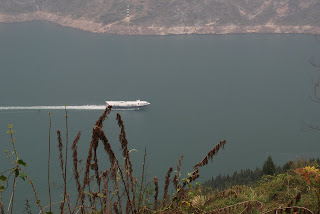
So, for my spring break, which was all of four days, me and four friends decided to take a lovely cruise down the Yangzi River through the Three Gorges. If you know me at all, you know that this is a lie. Four friends and I decided that instead of taking a relaxing cruise through three of the largest, most beautiful gorges in the world, we would trek across two of them and explore the Yangzi river from Wushan to Wuhan. Cara, Richie, Jay, Damien, and I packed our backpacks and headed out for our flight late on Wednesday night. The airlines in China are much better than the airlines in the United States. The service is pleasant and efficient, the stewardesses are attractive and friendly, and you get unlimited beverages and a meal during your flight. I was in airplane heaven.
We arrived in Wuhan at around 11:45 pm and opted to take a shuttle to our hostel, the Wuhan International Backpacker's Hostel. We didn't end up getting there until 2 am, and we knew we would have to wake up at around 5:30 am so we arrived, checked in, and immediately went to bed. However, the hostel is beautiful and so nice. I wish our stay there could have been a little bit longer.
When we woke up in the morning, we groggily pulled on our shoes and rushed over to the long distance bus station to catch a bus to Yichang, where our adventure would really begin. The first bus left at 6:30 am and we were on it. It was hard to sleep even though we had lots of space, because the bus featured a very loud and action packed Chinese kung fu movie, and the speakers were conveniently located above our heads. However, I stayed awake and looked at the fields and fields of rapeseed - a yellow flowering plant that is used to create canola oil and is grown all over the Yangzi basin. Farmers with the stereotypical cone straw hats worked their fields and lived in huts. It was the most rural area I had yet to see in China.

When we arrived in Yichang, the boys were grumpy but entertained by the kung fu movie, and there was a man from the Chinese travel agency CITS waiting to take us to the hydrofoil bus. The bus would take us to Sandouping, where we would catch a glimpse of the Three Gorges Dam and catch a really fast boat up the Yangzi River to a small town called Wushan. While waiting for the bus to arrive, we had a chance to get a group photo.

The bus took about forty minutes, and from a hill that we passed over we were able to see the Three Gorges Dam, the biggest, most expensive dam in the world. The Three Gorges Dam is the source of some controversy, and its effects on the Three Gorges water level would cause some trouble for us later on. But it is interesting news as it is almost completed and ships are already moving through the locks.

The hydrofoil was a very small, fast boat that zooms through the three gorges and makes several stops on the way to Chongqing. It was going to take us about two hours to get to Wushan, when on a ferry it would take eleven hours. We were the only foreigners on the boat, and the boys and Cara settled down for some much needed naptime in their chairs. I, however, took some time to take pictures of the scenery and the Xiling and Wu gorges that we passed through.
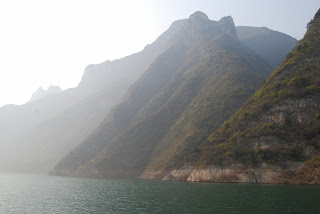

While I was on the boat taking pictures, I passed by the captain's deck where the men who work on the boat were all smoking and enjoying the elevated scenery from the higher deck. They invited me up to look around, and the captain tried to get me to sound the horn to an oncoming ship, but I didn't understand what he meant until he just shrugged and pushed it himself. The men were very nice and asked where I was from and why I was on the Yangzi river. I told them that my friends and I wanted to hike the Wu Gorge and visit some of the villages on the Yangzi before heading back to Wuhan. Then I asked them about a road that I had read about when preparing for the trip. Apparently there is a 400 year old plank road that runs about forty feet high on the Wu Gorge for eighteen miles. Porters moving between small villages carry supplies and food on the road, seamlessly balancing over 40kg of products over their backs. I had hoped to take this road for at least part of the way over the Wu gorge. However, the men shook their heads and told me that, because of the Three Gorges Dam, the water had risen so high that this wooden road was now underwater. So much for that idea. But the men told me they still thought we could hike the gorge as long as we were careful. They also tried to tell me about some of the mountain peaks in the gorge.
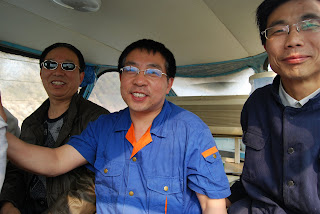
After two hours, we were in Wushan. We got off the boat and were immediately met by a crazy cab driver who desperately wanted us to buy cruises down the three smaller gorges, which are equally beautiful. No matter how many times we refused, he drove beside us on the road, talking on his cell phone to get a better deal to offer us. We all bought flashlights just in case we got caught out on the gorge in the dark, and we set out to find a detailed map of the Wu Gorge and some food.

We weren't having much luck with either of those endeavors until I made a friend walking down the street. I stopped her to ask her whether I could find a map in any of the stores nearby, and she ended up escorting us to her friend's hot pot restaurant for dinner. She was very motherly, and demanded to know exactly when we planned to leave on the hike and whether our flashlights had enough batteries in them. She made sure we had a hotel to stay in and looked everywhere to find a map for us while we ate. She was one of the sweetest women I've ever met, and she spent her whole evening making sure that we were as organized as we could be, even if she couldn't find a map for us.

That night, we slept in a decent hotel with running water and a western toilet. As usual, Jay and Damien got their own beds, Cara and I shared a bed, and Richie slept on the floor. We woke up in the morning, ready to start hiking. After a decent amount of breakfast, filling up our bags with water and snacks, and heading out to the Yangzi, we realized that we needed to get across to the other side of the river to cross a bridge to the side of the Wu Gorge we wanted to hike. Wushan is at an intersection of the Yangzi River and the Daning River, which feeds into the Yangzi. We needed to find a way to get across the Daning to cross a big bridge over the Yangzi.

Well, there's no better way to cross a river than to be smuggled across it. We were met with the same group of over eager taxi and boat drivers that morning as we reached the Daning River, and we bargained hard for passaged across the river for 100 Yuan, which is $15 between five people. A man led us over the beach, ducking his head frequently and checking to see who was watching. What we didn't realize is that in Wushan, while foreigners frequently pass by the town on the way to take a smaller cruise up the Yangzi, they only take these smaller cruises with a company that has a monopoly over the foreigners. The locals not only never see white people, they are not allowed to take them on boat trips. We would have appreciated this knowledge when the man taking us across the river ushered us into the inner hold of his small boat and started to close and lock the hatch behind us before we stopped him and demanded he leave it open. We were all getting pretty nervous, expecting that he would take us to some random spot on the river and demand more money, but I crept up to the front window to watch him work, and make sure he was going the right direction across the river.
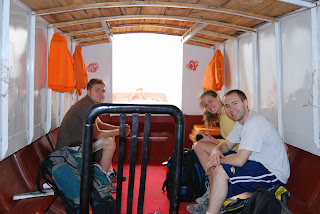
Well of course the man was honest and he immediately took us to the other side of the river. However, the first time he tried to land, someone was watching and he shoved Ritchie, who was about to leave the hatch, back into the boat's hold and went around to another, more secluded landing spot. By now he was clearly stressed out, and we had finally figured out what was going on, and tried to do him a favor by leaving quickly and quietly. Below is a picture of the boat and our smuggler.

After we got up the boat, we hiked up through someone's farm and found a main road. It was concrete, and it led to the red bridge shown above. We followed this road for about three miles of the hike, as it stretched over the bridge and through the higher reaches of the gorge. We started attracting some attention from drivers on the road, and farmers driving trucks full of pigs, chickens, and crops yelled hello to us. We passed through one dusty town in particular, where an old man with his dog, a younger man, and a middle aged woman all immediately set out chairs for us to sit and chat a while. We sat down for five minutes and asked about the best ways to get through the gorge. The men and woman asked, like all the other Chinese we had spoken to, why we didn't just take a cruise. We told them we liked to walk a lot.
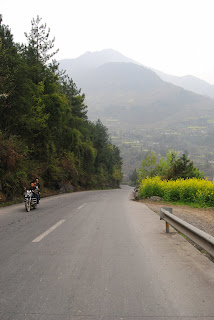
After saying goodbye to the old man and his dog, we watched the woman walk over to a chicken that had fallen off of a truck and become road kill. She proceeded to pick up the limp and mangled chicken, drop it into a huge metal bucket, and pour boiling hot water all over it. Then we watched her start pulling the feathers off. Obviously she was taking advantage of the chicken to prepare dinner. I guess if anything that's certainly not wasteful. Another interesting thing we saw was a "kindergarten," where all the farmers' children in the town not old enough to be in school were sitting with an old woman while their parents worked. They were so suprised to see us, they just sat and stared at us with their mouths open.

After walking on the main road for a while, we found it was more convenient to turn off the road and walk on a dirt road that eventually turned into trails through terraced farmland. We saw the most exquisite examples of terraced farming I've ever seen before, and it's amazing that the Chinese waste no space on the mountain. Every possible farming plot is carved out, flattened, and filled with tidy, tight rows of crops. Some terraces were outlined in stone, and others were simply carved out of the dirt.


We continued like this for quite some time, passing through farm after farm, meeting farmer after farmer. Most of them waved at us, but none of them spoke any English and none of them had ever seen a white person before. We kept imagining how weird it was for them, just doing their daily chores and looking up to see five westerners walking through their plot of land. They were all so kind, offering us water from their wells (which we definitely didn't drink for fear of getting really sick in the wilderness), offering us a seat to rest and offering us advice on how to get through the next part of the gorge. It was so amazing to get glimpses into the lives of people who never leave a one mile radius.
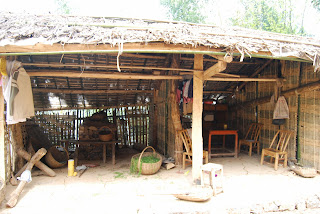
We kept going, passing through villages and seeing some of the most amazing views. The Wu Gorge was awesome, filled with odd-shaped peaks, terraced farms, and miles and miles of green. We found ourselves at the edge of steep cliffs, and wandering through thick bamboo forests. The paths that led farmers to their scattered plots of crops also led us from small village to small village, each one only a cluster of sheds and houses. We hiked for hours that day, relying solely on the directions that the farmers gave us as we passed by.

Finally we got to a point where we couldn't figure out where to go next. Ahead of us were some of the steepest rock cliffs we would see on our side of the gorge, and below them was a wall of underbrush and grass. We circled back to the last village we passed and asked the farmers which direction to take. Two of them looked at each other, dropped their picks, and told us they would be our guides and show us the way. Jay was nervous about the farmer in front, who was carrying a machete that hung out of the belt of his pants. They led us through a very difficult pathway, only about six inches wide, that led us almost straight down to the base of the cliffs. We were doing the most serious rock climbing I have ever done, and with heavy backpacks on our backs. Our guides were very attentive though, talking to each other in Chinese and laughing as they made sure especially that Cara and I made it down the cliffs carefully.

Everytime we got to a point where we didn't think we could make it, our guides would urge us on, one going in front, and the other in the back. They were wearing canvas shoes with straw bottoms, and every once in a while before another hard climb down they would say "xiuxi", or "rest", and urge us to sit and take some of their cigarettes. Below is one of our guides showing us the way down a steep rock face. The other guide is in the second picture, resting during one of our "xiuxis."


We got to a certain point where the guides could point out the rest of the trail to us. It wouldn't be too much easier from here, but at least we could see the start of more terrace farms on the other side of the trail. They started to leave, not asking for anything from us, and we demanded that they take 50 yuan from us for our trouble. They adamantly refused until we said that we were so thankful to them and we wanted to give it to them as a gift, not as payment. They were the two most influential people on our trip, and they expected absolutely nothing from helping us. We continued onward, dealing with a lot of thorny underbrush and climbing along the bottom of cliff faces, but without our mountain guides.


Then, disaster struck...almost. There was a part of the climb down where the trail is dirt and covered in dry leaves and grass, and very steep. Then the trail veers sharply right to follow the cliff face, and to your left there is nothing. The cliff continues, but is covered in weeds and bushes, and the trail turns into a wall that you have to climb down to continue. On my way down the first part of this trail, I slipped on some dry leaves and grass and fell. I rolled 360 degrees, over my body and my backpack, and off the cliff. It all happened in 2 seconds, and but it seemed like it was happening in slow motion to me. For a moment, there was nothing between me and my being smashed on the rocks 40 feet below me. I was very calm and I remember thinking something like "okay, I'm going to die now." However, just as my body went over the cliff, I reached out my right arm and grabbed hold of the weeds and bushes sticking out from the side of the cliff. Luckily they were firmly rooted, and my body swung, right side up, back towards the cliff face, allowing me to grab on to underbrush with both hands, my feet scrambling to find a hold on the cliff face. My legs and arms were scratched and cut pretty badly, but nothing was injured, and my camera survived (really the important thing). As soon as I was right side up again I could hear Jay and Richie yelling at me and Cara screaming. They helped me get back from the cliff to the trail, and we kept going. But I have a few small war wounds as souvenirs of my near-death experience.

After that one incident, the Yangzi River Adventure team continued onward, and we pushed our way through a lot of overgrown underbrush to get to where we wanted to be - another terraced farmland. We kept walking for another two hours, trying to work our way through several patches of bamboo forests, and finally making it down from high on the mountains to a town that sits on the Yangzi River. I don't know the name of it now, but it was a much larger cluster of houses than villages we had previously visited. A woman told us that the jungle ahead of us was way too overgrown for us to get through, and we would not be able to continue. By this time it was 4pm, and we had been hiking for nine hours, so we were exhausted. She told us that a ferry was coming in ten minutes to pick up villages, and we could get on it and get to the next town from there. Just as she said this, the ferry pulled up at a different dock from the one that we were on, and we started screaming and waving our arms to the ferry to get them to come back to us. Luckily for us, the ferry captain came to our dock and let us on.
We ended up sitting on the ferry for three hours, talking with the locals. Immediately, two 13-year-old girls came up to Cara and I and told us in broken English that they wanted to make new friends. The second thing they told us was that we were the first foreigners they had ever met. Zhong Hua, a very confident 14-year-old boy, introduced himself in slightly better English and asked for our email addresses so we could all be pen pals. They sat with us for the whole boat ride until their own stops, asking about America and about our adventures on the Yangzi. The girls and Zhong Hua go to school in Wushan, and only get to go home and see their families-who live in villages like the ones we hiked through-three times a month. Other travellers took an interest in us too, but because they didn't speak English they were shy about coming up and talking to us, and instead asked the students to interpret for them. Richie met a 6-year-old boy wearing a matching sweatshirt, and found out that they spoke Chinese on exactly the same level. Richie called him his "xiao pengyou," or "little friend," and they discussed their likes and dislikes for about two hours of the boat ride because that is all Richie can discuss. The most amazing thing about this ferry ride is that the ferry would stop at these seemingly uninhabitable places, with only jungle, pine trees, and rocks leading up to tall mountain peaks along the gorge. The people would get off, most of them farmers with huge bags of supplies, but also including our middle school girls, and just start rock climbing up the mountain. Their villages were totally inaccessible by car and by boat, and the only way to get there was on foot. The photos below are of our new friends and how they were able to return to their villages from the boat.

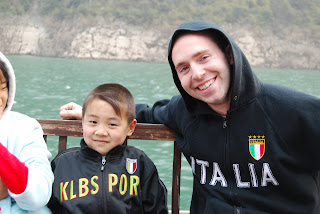

The ferry captain told us to go to Peishi, a village about 2/3 of the way through the gorge, and from there take a boat to Badong, where we wanted to stay that night. We arrived in Peishi, and Zhong Hua was so excited, because this was his home town. He called everyone he knew, trying to find a boat that would take us to Badong. Finally he settled on a local who happened to have a speed boat. The man initially wanted to charge us 400 yuan to get to Badong, which was clearly a rip-off, but we told him we would only pay 300 yuan. Zhong hua translated the negotiations for us. The man agreed, and we all climbed in to his speed boat. Now that he had us, he turned around and again demanded 400 yuan. We refused, and he said he wouldn't do it, confident that we had no other options in Peishi. The negotiating started again, and Zhong hua got him down to 350 yuan and then angrily stomped his foot on the boat. "Very dislike," Zhong hua said as he apologized to us for the man's bad manners.
However, the man got us to Badong in about a half an hour, and we found a very interesting Chinese hotel to stay in almost immediately. Badong sits in the cradle of the Xiling gorge and the Wu gorge, and is rarely visited (if ever) by cruise ships or Westerners. However, the hydrofoil that returns to Yichang stops there, and we were sure of getting a boat ride to Yichang in the morning. The woman who owned the hotel wouldn't stop giggling as she showed us the room. Everytime we said something in Chinese she would giggle again, and every time we said we didn't understand what she was saying, she'd really laugh out loud. She charged us 100 yuan for three rooms, one that Richie and Jay shared with twin beds, Cara and I shared a room with a double bed, and Damien slept in a single with just one bed. We had a showerhead over the squatter toilet in our bathrooms, but the water was hot and pretty reliable, and the room was decently clean. We paid about $3 a person to stay there that night. The woman came in later that night to tell us that she was very happy that we decided to stay in her hotel, because she thought we were very interesting - this was her first encounter with white people as well (thus explaining the giggling).
In the morning we caught the hydrofoil to Sandouping, about 40km north of Yichang. This is where the Three Gorges Dam is located, and we thought we would try to look at it without paying the 105 yuan entrance fee to view it (not walk on it). We walked up the road from the hydrofoil port and saw the locks that boats have to go through to get past the dam, and we saw the crackling power lines that suck out the electricity that the Dam creates. The dam is now powering almost 1/10 of China's electricity needs. However, the Yangzi River was smoggy that day, so while we could kind of see the dam's outline, we certainly did not have a clear view of it, which was definitely a let down. We tried everything, from climbing hills in the area to sneaking around the army barracks wall to get a good view, but to no avail. The pictures below are of the crackling powerlines leading to the dam and the locks that boats wait in to get through the dam. You can see slight outlines of the dam in each of these pictures close up.

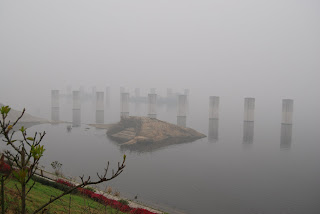
After our let down Three Gorges Dam viewing, we caught a bus to Yichang, ate some really good baozi and hot noodles in a Chinese restaurant, and caught another long distance bus back to Wuhan, where we wanted to spend our last night. Unfortunately, the awesome hostel we stayed in on our first night in Wuhan was booked on Saturday night, and we had to find a hotel when we got there. Luckily, we stumbled upon a really great hotel in Hankou, one of three districts in Wuhan. And it was very well situated because, on the streets below, there is a massive night market, with vendors selling everything from hua'r (meat on a stick) to underwear to Mao's little red book. We wandered through the stalls, eating Chinese junk food and snacks and exploring the vendors' wares. Cara and I found an amazing bakery called Roti Princess, where they sell Roti, a Malaysian bread that is very sweet and butter (a tiny bit like the O'Charley's rolls but better). We ate so many of the huge rolls because they were probably the best thing we've tasted in China so far. At around 11pm, we were so exhausted that we all collapsed in our hotel rooms and conked out for the night.


Our last day, I woke up early and left the hotel, wandering some of the nearby Wuhan streets by myself for a while. I got a snack and some coffee, and checked out the area. We were staying in the more upscale area of Wuhan, featuring a bund on the side of the Yangzi River and various fancy bakeries and Nike stores. When the others woke up we packed our bags one last time, checked our plane tickets, and headed out together to explore parts of Wuhan. Cara and I wanted to try Wuhan's famous hot and dry noodles, which is a popular breakfast food of spicy noodles that frequently comes with what I would describe as refried garlic bread. It was amazing, and I got sauce all over my face. We took a cross-river ferry to Wuchang, which is another district in Wuhan. Here we saw the Yellow Crane Tower, and the cherry blossom festival at Wuhan University.
Wuhan is a huge city, and called one of China's "furnaces." An industrial and transportation giant, almost anyone travelling from the north of China to the south has to pass through Wuhan. The boats that pass through Wuhan on the Yangzi are coming from Shanghai, Nanjing, and local villages, so there is a hodge podge of river travellers here.


The Yellow Crane Tower is a 600 year old building with a beautiful legend. An old tavern keeper once had a Taoist immortal stay at his inn. Instead of giving the owner money for his stay, the immortal drew a yellow crane on the wall that would fly out in the evening and entertain the tavern keeper's guests. The tavern keeper made an enormous amount of money from the yellow crane, and so when the immortal finally left the tavern and continued on his travels, the tavern keeper built a massive tower in his honor - known as the Yellow Crane Tower. It is beautiful, located on top of Snake Hill, and houses mahogany rooms, Chinese screens and paintings, and some pretty upmarket souvenir shops.



After walking through the Yellow Crane Tower complex, complete with other pagodas, a temple, and gardens modeled after the gardens in Suzhou, we took taxis to Wuhan University. Today was a very special day there, because the university was celebrating the blooming of its cherry blossoms and plum blossoms. The trees were so beautiful, and the campus is huge and awe-inspiring. Despite the thousands of people there to enjoy the festival and see the trees, the campus was very green and very peaceful. We enjoyed every minute of our time there, and after such a tumultuous journey down the Yangzi River, it was a nice way to end our vacation.




Upon leaving Wuhan University, we found a mini-bus driver who would drive all of us to the airport for 150 yuan, and we finally arrived back at Beijing University at 10pm that night.
 Cuandixia is a small village in the mountains, once a stopover on the journey between the Forbidden City and Shanxi province. It used to be the goat supplier for the Forbidden City and the Emperor, but now is well out of the way of the highways directly linking Beijing to Shanxi, and has become a little known tourist attraction. The town is 400 years old, and is built mostly out of stone on the side of a mountain. The whole town is nestled into a valley, and the townspeople there all offer rooms for rent and hearty meals. The people there make money for living their lives just as they would without visitors, so they nap, grind grain, shell nuts, and cook meals all with smiles on their faces for tourists' cameras. But it does not seem touristy or fabricated at all there. Wandering through the small lanes and alleways, seeing the colorful doorways and screens, and exploring the courtyard style quadrangle homes that were so typical of successful families in the Ming and Qing eras is really like travelling back in time.
Cuandixia is a small village in the mountains, once a stopover on the journey between the Forbidden City and Shanxi province. It used to be the goat supplier for the Forbidden City and the Emperor, but now is well out of the way of the highways directly linking Beijing to Shanxi, and has become a little known tourist attraction. The town is 400 years old, and is built mostly out of stone on the side of a mountain. The whole town is nestled into a valley, and the townspeople there all offer rooms for rent and hearty meals. The people there make money for living their lives just as they would without visitors, so they nap, grind grain, shell nuts, and cook meals all with smiles on their faces for tourists' cameras. But it does not seem touristy or fabricated at all there. Wandering through the small lanes and alleways, seeing the colorful doorways and screens, and exploring the courtyard style quadrangle homes that were so typical of successful families in the Ming and Qing eras is really like travelling back in time.
 After walking through the town for about an hour, my friend Georgette and I decided to go exploring in the area around the town. We headed up a path through the hills, and found a small holding pen. Inside, to our delight, were four baby goats. They were less than happy to see us as we snuck inside their pen to pet them (and potentially get whatever diseases they were carrying), but they were so small and cute. It is interesting that we got to see some goats, because Cuandixia was known as "Goat Heaven" during the Qing Dynasty.
After walking through the town for about an hour, my friend Georgette and I decided to go exploring in the area around the town. We headed up a path through the hills, and found a small holding pen. Inside, to our delight, were four baby goats. They were less than happy to see us as we snuck inside their pen to pet them (and potentially get whatever diseases they were carrying), but they were so small and cute. It is interesting that we got to see some goats, because Cuandixia was known as "Goat Heaven" during the Qing Dynasty.
 Then, of course, I found a mountain to climb, and Georgette sunbathed while I climbed up in search of a good spot to photograph the town from above. I wandered through what seemed like trails up to a peak, got some pictures, and met Georgette on the way down. Until the 20th century, only the descendants of one family lived here, the Han family. Each member of the family had a specific responsibility in handling the businessmen and travellers that stopped in the village. They sold nuts, goats, mountain crops, and honey. I almost got to know the honey making business intimately when I stomped loudly through a dozen man-made beehives sitting inconspicuously on top of a hill. Luckily the bees were not too interested in me.
Then, of course, I found a mountain to climb, and Georgette sunbathed while I climbed up in search of a good spot to photograph the town from above. I wandered through what seemed like trails up to a peak, got some pictures, and met Georgette on the way down. Until the 20th century, only the descendants of one family lived here, the Han family. Each member of the family had a specific responsibility in handling the businessmen and travellers that stopped in the village. They sold nuts, goats, mountain crops, and honey. I almost got to know the honey making business intimately when I stomped loudly through a dozen man-made beehives sitting inconspicuously on top of a hill. Luckily the bees were not too interested in me.

 As for sight seeing and interesting things in China, Cuandixia is about all I did. I had a pretty nasty sinus infection, so I stayed home and slept a lot, and did homework. It was nice to get the extra rest, as I have a big trip next weekend!
As for sight seeing and interesting things in China, Cuandixia is about all I did. I had a pretty nasty sinus infection, so I stayed home and slept a lot, and did homework. It was nice to get the extra rest, as I have a big trip next weekend!























































